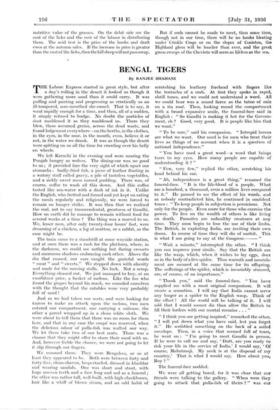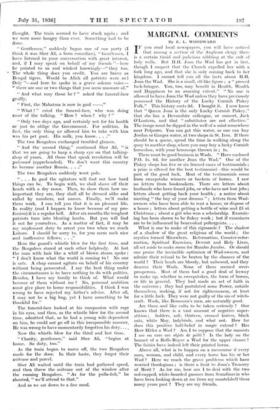BENGAL TIGERS
By RAN.TEE SHAHANI
THE Lahore Express started in great style, but after a day's rolling in the desert it looked as though it were gathering more sand than it could carry. It was puffing and panting and progressing as erratically as an ill-tempered, sore-mouthed she-camel. That is to say, it went rapidly enough for a time, and then, all of a sudden, it simply refused to .budge. No doubt the particles of dust maddened it as they maddened us. There they blew, these accursed grains, across the dead waste, and found lodgement everywhere—on the berths, in the clothes, in the eyes, in the nose, in the mouth, even, believe it or not, in the water we drank. It was as though the desert were spitting on us all the time for crawling over his belly on wheels.
We left Karachi in the evening and were nearing the Punjab hungry as wolves. The dining-car was no good to us ; it provided fare the very sight of which upset our stomachs : badly-fried fish, a piece of leather floating in a watery stuff called gravy, a pile of tasteless vegetables, and a sickly sweet mess named pudding. There was, of course, coffee to wash all this down. And this coffee tasted like sea-water with a dash of ink in it. Unlike the English, who fretted and fumed and yet kept on eating the meals regularly and religiously, we were forced to remain on hunger strike. It was then that we realised the real, not to say transcendental, greatness of Gandhi. How on earth did he manage to remain without food for several weeks at a time ? The thing was a marvel to us. We, lesser men, after only twenty-four hours' fast, were dreaming of a chicken, a leg of mutton, or a rabbit, as the case might be.
The train came to a standstill at some wayside station, and at once there was a rush for the platform, where, in the darkness, we could see nothing but flaring cressets and enormous shadows embracing each other. Above the din that ensued, our ears caught the grateful words " meat " and " sweets." We stepped down with alacrity and made for the moving stalls. No luck. Not a scrap. Everything cleaned out. We just managed to buy, at an exorbitant price, a basket of melons. Like the fox who found the grapes beyond his reach, we consoled ourselves with the thought that the eatables were very probably full of sand !
Just as we had taken our seats, and were looking for knives to make an attack upon the melons, two men entered our compartment, one carrying a suitcase, the other a parcel wrapped up in a clean white cloth. We were about to tell them that there was no room for them here, and that in any case the coupe was reserved, when the delicious odour of pulla-fish was wafted our way. We let them take two of our best seats. There was a chance that they might offer to share their meal with us. And, however feeble the chance, we were not going to let it slip through our fingers.
We scanned them. They were Bengalees, or so at least they appeared to be. Both were between forty and forty-five, clean-shaven, bespectacled, dressed in khaddar and wearing sandals. One was short and stout, with huge uneven teeth and a face long and sad as a, funeral ; the other was rather tall, well-built, with high cheekbones, hair like a whiff of blown steam, and an odd habit of scratching his leathery forehead with fingers like the tentacles of a crab. At first they spoke in rapid, shrill tones, and we could not understand a word. All we could hear was a sound fierce as the tatoo of rain on a tin roof. Then, looking round the compartment with a broad expansive smile, the funeral-face said in English : " So Gandhi is making it hot for the Govern- ment, eh ? Good, very good. It is people like him that we want."
" To be sure," said his companion. " Intrepid heroes are what we want. Our need is for men who treat their lives as things of no account when it is a question of national independence."
" You have used a great word—a word that brings tears to my eyes. How many people are capable of understanding it ? "
" Few, very few," replied the other, scratching his head behind his ear.
" Ah, independence is a great thing," resumed the funeral-face. " It is the life-blood of a people. What are a hundred, a thousand, even a million lives compared to it." He paused to see the effect of his words, and as nobody contradicted him, he continued in confident tones : " To keep people in subjection is pernicious. Not only for the people. Even more for those who exercise the power. To live on the wealth of others is like living on death. Parasites are unhealthy creatures at any time. They soon begin to lose the use of their limbs. The British, in exploiting India, are inviting their own doom. In course of time they will die of surfeit. This is what I am going to say at the Congress " Wait a minute," interrupted the other. " I think you can improve your simile. Say that the British are like the wasp, which, when it wishes to lay eggs, does so in the body of a live spider. Thus warmth and nourish- ment are secured at the same time for its offspring. The sufferings of the spider, which is invariably stunned, are, of course, of no importance."
" Thank you," said the funeral-face. " You have supplied me with a most original comparison. It will create a sensation. I will say that India cannot serve any longer as a spider to the English wasp. Think of the effect ! All the world will be talking of it. I will add that I would sooner die than allow the British to fill their larders with our mortal remains . . . "
" I think you are getting inspired," remarked the other. " I will put down what you have said, lest you forget it." He scribbled something on the back of a soiled envelope. Then, in a voice that seemed full of tears, he went on : " I'm going to meet Gandhi in person. If he were to call me and say, Dutt, are you ready to risk your life in the service of India,' I would say, ' Of course, Mahatmaji. My neck is at the disposal of my country,' That is what I would say. How about you, Roy ? "
The funeral-face nodded.
We were all getting bored, for it was clear that our friends were talking to the gallery. " When were they going to attack that pulla-fish of theirs " was our thought. The train seemed to have stuck again ; and we were more hungry than ever. Something had to be done.
" Gentlemen," suddenly began one of our party (I think it was Sher Ali, a born comedian), " Gentlemen, I have listened to your conversation with great interest, and, if I may speak on behalf of my friends "—here he pointed to us and winked knowingly—" they too.
• The whole thing does you credit. You are brave as Bengal tigers. Would to Allah all patriots were so I Only "—and here he spoke in a grave solemn voice- " there are one or two things that you seem unaware of."
" And what may those be ? " asked the funeral-face gruffly.
" First, the Mahatma is now in gaol —."
" What ! " cried the funeral-face, who was doing most of the talking. " How ? when ? why ? "
" Only two days ago, and certainly not for his health or just to oblige the Government. For sedition. In fact, the only thing we allowed him to take with him was his pet goat. His milk, you know. . . ."
The two Bengalees exchanged troubled glances.
" And the second thing," continued Sher Ali, " is that we are going to keep a sharp eye on that talking- shop of yours. All those that speak revolution will be pukraoed (apprehended). We don't want this country to become another Russia. . . ."
The two Bengalees suddenly went pale.
tt In gaol the agitators will find out how hard things can be. To begin with, we shall shave off their heads with a dry razor. Then, to show them how un- important they are, they shall all be dressed alike and called by numbers, not names. Finally, we'll make them work. I can tell you that it is no pleasant life. In reality (and I happen to know because of my pro- fession) it is a regular hell. After six months the toughest patriots turn into bleating lambs. But you will find it out for yourselves. As a matter of fact, it may be my unpleasant duty to arrest you two when we reach Lahore. I should be sorry to, for you seem such nice and inoffensive fellows. . . ."
Here the guard's whistle blew for the first time, and the Bengalees stared at each other helplessly. At last the man with hair like a whiff of blown steam spoke ; " I don't know what the world is coming to ! No one is safe. A chap cannot agitate on behalf of his country without being persecuted. I say the best thing under the circumstances is to have nothing to do with politics. Besides, I have my family to think of. What would become of them without me ? No, personal ambition must give place to home responsibilities. I think I was wrong to have rejected my father's advice. After all, I may not be a big bug, yet I have something to be thankful for."
The funeral-face looked at his companion with rage in his eyes, and then, as the whistle blew for the second time, admitted that, as he had a young wife dependent on him, he could not go off in this irresponsible manner. He was wrong to have momentarily forgotten his duty.. .
Now the whistle blew for the third and last time.
" Charity, gentlemen," said Sher Ali, "begins at home. So duty, too."
As the train began to move off, the two Bengalees made for the door. In their haste, they forgot their suitcase and parcel.
Sher Ali waited until the train had gathered speed, and then threw the suitcase out of the window after the running Bengalees. " As for the pulla-fish," he shouted, "we'll attend to that."
And so we sat down to a fine meal.







































 Previous page
Previous page